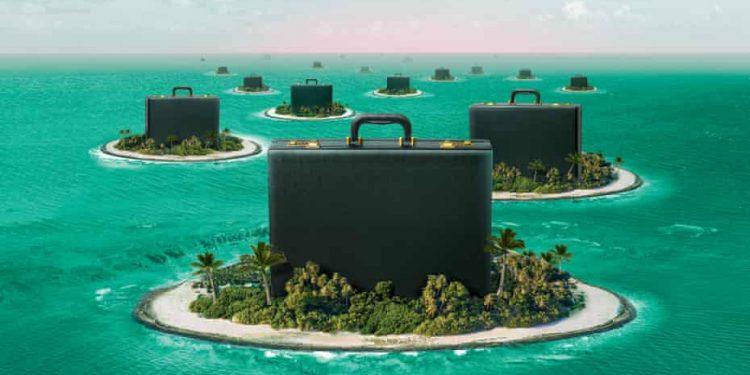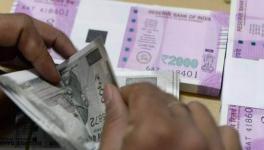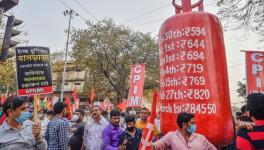Unpacking the Pandora Papers Revelations

The Pandora Papers show how several rich and powerful Indians, including tax defaulters and corporate entities, form offshore Trusts and companies by exploiting loopholes in our tax laws, park their money and buy assets in tax sanctuaries while the ordinary citizen shudders at the prospect of missing the deadline for filing tax returns, writes ANINDA DEY.
THE first few lines of the English rock band Pink Floyd’s single Us and Them, from their 1973 hit album ‘The Dark Side of the Moon’, sound hauntingly eerie in light of the recent opening of the Pandora’s box.
Us (us, us, us, us) and them (them, them, them, them)
And after all we’re only ordinary men
Me
And you (you, you, you)
God only knows
It’s not what we would choose (choose, choose) to do (to do, to do)…
A common Indian (Us) earning between INR 2.5 lakh and INR 5 lakh per annum has to shell out 5% income tax both under the old tax regime (with deductions and exemptions) and the new one (minus deductions and exemptions), and has to pay more tax as the income increases. While a small-time businessman hiding a few lakhs in some secret corner of the house can get nightmares with the looming phantom of the taxman.
On the other hand, the rich and the powerful (Them), who park their wealth on “the dark side of the moon” — the British Virgin Islands (BVI), Seychelles, Singapore, Hong Kong, Belize, Panama and other secret jurisdictions — get away with tax evasion.
Despite laws making it mandatory to pay taxes on foreign assets and investment, Indians who have tucked away cash and acquired assets in tax sanctuaries evade taxes with the help of shell companies, Trusts and Foundations set up in such countries. The complexity of such structures makes it impossible for the Government to trace the ownership of the asset or the investment.
The Pandora Papers show how the loopholes in the Black Money (Undisclosed Foreign Income and Assets) and Imposition of Tax Act, 2015 (the Black Money Act) and the Income Tax Act, 1961 have allowed individuals and companies who have assets and investment in tax havens to avoid and evade tax. While the Panama Papers, published in 2016, and the Paradise Papers, first published in 2017, exposed the offshore companies of individuals and corporate entities, the Pandora Papers reveal how Trusts assist them in concealing their identities.
Also read: India must hunt down those who diverted public money to offshore tax havens
The rich and powerful get away
The names of 380 Indians and entities figure in the 2.94 tetrabyte data in the Pandora Papers, which contain 11.9 million leaked files from 14 international financial services companies that established around 29,000 shell firms and private Trusts for the wealthy and business entities in more than 200 countries.
In the biggest journalistic collaboration involving more than 600 journalists from 150 media outlets, including The Indian Express, the BBC and The Guardian, in 117 countries, the investigation by the International Consortium of Investigative Journalists (ICIJ) revealed the name of Reliance Anil Dhirubhai Ambani Group chairman Anil Ambani as the biggest Indian defaulter in the list.
Owing more than INR 5,000 crore to three Chinese banks — Industrial and Commercial Bank of China, China Development Bank and the Export-Import Bank of China — Anil Ambani had declared his net worth “zero” in a London court. However, The Indian Express investigation reveals that Anil Ambani and his representatives own, at least, 18 offshore companies set up between 2007 and 2010 in Jersey, the BVI and Cyprus with seven of them having borrowed and invested a minimum USD 1.3 billion.
While an ordinary citizen trembles at the prospect of defaulting on a bank loan, big defaulters, like Ambani, stash their millions in tax havens. As of now, Reliance Capital’s consolidated debt is INR 40,000 crores. Even if the resolution process of Reliance Commercial Finance and Reliance Home Finance is completed, which will reduce the debt by 50%, as claimed by Ambani in September, the company will still owe INR 20,000 crores to its lenders.
Similarly, Ajay Ajit Peter Kerkar, the promoter of bankrupt travel firm Cox and Kings, who was arrested by the Enforcement Directorate (ED) in November 2020 for owing INR 5,500 crores to banks and financial institutions, had established two Trusts in the BVI in 2010. The Trusts are guarantors for loans totalling USD 79 million.
Apparently, stringent laws on money laundering, tax evasion and black money are only applicable to the lower and the middle classes while the rich and the ultra-rich flout financial norms with impunity.
Purvi Modi, sister of fugitive diamantaire Nirav Modi—the main accused in the INR 11,000 crores Punjab National Bank scam—set up Brookton Management in the BVI, which acted as the protector of The Deposit Trust, in December 2017, one year before he fled India. Purvi claimed that Brookton was funded by her salary and personal earnings as the creative director of Firestar, the company accused of defrauding the bank, according to The Indian Express investigation.
The name of Securities and Exchange Board of India (SEBI) is enough to unnerve the “Gordon Gekkos” of India. Once banned for securities fraud or insider trading, it is illegal for a company to hire services of such brokers or companies during that period. However, Kunal Ashok Kashyap, banned by the SEBI from the stock market for a year for insider trading in Kiran Mazumdar-Shaw-headed Biocon Limited shares, was appointed as the ‘protector’ of The Deanstone Trust.
Mauritius-based Glentec International set up the Trust in New Zealand in July 2015. According to the papers, Glentec, which holds shares of Biocon, is 99% owned by Mazumdar-Shaw’s husband and British citizen John McCallum Marshall Shaw.
Glentec has cash and investment of about USD 55 million, and real estate assets valued at approximately USD 30 million, the investigation revealed.
Two former officers of the Indian Revenue Service, one arrested for alleged corruption and money laundering, and another who was an Income Tax Chief Commissioner, have also been named to have Swiss bank accounts, by The Indian Express investigation.
Also read: In post-Covid world, India must fix its broken tax structure to achieve social and economic justice
Trusts hide the real owners of foreign assets
High-net-worth Indians (HNIs) and big companies can hide their real identities by forming a Trust/Foundation that looks after their investment/personal assets in a tax haven, like Panama or the BVI, or an offshore shell company in a country with strict privacy laws and minimum taxes to park their money. Consequently, they can easily avoid taxes since it is the Trusts/Foundations, not them, that hold their assets and also not repay loans to creditors.
Such HNIs and companies are assisted in the process by financial services providers, banks and law firms which create byzantine corporate structures to avoid their detection. Thus, black cash or taxable income can be parked in these Trusts/ Foundations or shell companies and transferred or used to purchase luxury apartments, bungalows, mansions and condos in exotic foreign locales or private jets and yachts.
The whole game of forming a Trust in a foreign country with strict privacy laws revolves around the settlor, the Trustee (the third party) and the beneficiary. Since Trusts in India and foreign countries are not banned by the Indian Trusts Act, 1882, individuals or corporate entities can form an overseas Trust with the help of foreign companies owned by their relatives or close friends. For example, The Deanstone Trust, established by Mauritius-based Glentec, owned by Mazumdar-Shaw’s husband, is in New Zealand.
Section 4 of the Indian Trusts Act states that a Trust can only be created for any “lawful purpose”, and it would be considered void if it is “forbidden by law or is of such a nature that, if permitted, it would defeat the provisions of any law or is fraudulent or involves or implies injury to the person or property of another or the Court regards it as immoral or opposed to public policy”.
However, the term “law” here as applicable to a Trust of immoveable property situated in a foreign country, refers to the law of that country. This is a grey area in the Indian Trusts Act, since every country has a different set of laws, and a Trust in a foreign country might not violate its domestic laws.
Loopholes in the laws
According to the Black Money Act, “undisclosed asset located outside India” means an asset, including financial interest in any entity, located outside India held by the assessee in his/her name or in respect of which he/she is a beneficial owner.
Section 41 of the Act imposes a penalty three times the tax computed under Section 10 in respect of undisclosed foreign income and assets on the assessee plus the tax.
Similarly, Section 42 imposes a penalty of INR 10,00,000/- on a person “being a resident other than not ordinarily resident in India within the meaning of clause (6) of Section 6 of the Income Tax Act who is required to furnish a return of his income for any previous year” if he/she fails to furnish such return for owning a foreign asset, including financial interest in any entity, as a beneficial owner or having any income from a source located outside India.
Section 5(1)(c) of the Income Tax Act states that the total income of any previous year of an Indian includes income that accrues or arises to him/her outside India during such year. If the person is not ordinarily resident in India “within the meaning of subsection (6) of Section 6, the income which accrues or arises to him outside India shall not be so included unless it is derived from a business controlled in or a profession set up in India”.
However, these Sections become redundant if the assessee forms an offshore Trust that looks after his/her assets through a foreign company not directly owned by him. If there are several Trusts and shell companies formed by the assessee in obscure tax jurisdictions, it becomes almost impossible to trace the real owner due to stringent privacy laws of such countries. This ensures that the assessee’s foreign income/assets are not taxed in India.
Such individuals/companies prefer to invest or buy assets in territories like Bermuda and the Cayman Islands, which don’t charge income or capital gains, or Liechtenstein and Switzerland, where the rate of taxation is low, or Panama, where cross-border transactions are not taxed. Territories like the BVI, Antigua & Barbuda and the Bahamas offer financial benefits and privileges to offshore companies.
According to The Indian Express investigation, Mumbai-based Hiranandani Group founder Niranjan Hiranandani, his wife, son and daughter were the beneficiaries of The Solitaire Trust, which had accumulated assets of more than USD 60 million.
Hiranandani’s Dubai-based son, Darshan, set up at least 25 companies as the director and the Trust in the BVI between 2006 and 2008. Niranjan was the ‘reserve director’ of at least three such firms.
By July 2008, the father-son duo had resigned as directors of most of these companies and in subsequent years, the shareholdings of these companies were transferred to Trident Trust Company, which had been appointed as the Trustee of The Solitaire Trust. By May 2017, the assets of The Solitaire Trust had grown by a whopping USD 60 million.
While some businessmen, like Anil Ambani, declare themselves bankrupt in public, others are tagged wilful defaulters by the Government. However, in private, they set offshore firms to route their funds to avoid paying the lenders.
For example, Mumbai-based Antrix Diamonds Exports, promoted by Ajay Gandhi, who has defaulted on INR 500 crores’ loans taken from 19 Indian banks, established offshore firms with crossholdings in association with billionaire Saudi businessman Saeed Khalifa Mohammed Al Fuqaei, who is linked to indicted Mexican drug lord Hassein Eduardo Figueroa Gómez.
In July, the Union Minister of State for Corporate Affairs Rao Inderjit Singh informed the Rajya Sabha that 2,38,223 shell companies had been identified in the last 3 years.
“There is no definition of the term ‘shell company’ in the Companies Act and it normally refers to a company without active business operation or significant assets, which in some cases are used for illegal purposes such as tax evasion, money laundering, obscuring ownership, Benami properties, among others,” he said in a written reply.
In April 2015, before the black money Bill was enacted, Bharatiya Janata Party leader and Rajya Sabha member Subramanian Swamy claimed that it would be ineffective in bringing back cash parked in tax havens.
“The Bill in the present form has nothing to do with how black money should be brought back to the country. The Bill plays a role in cases when black money is already detected or someone voluntarily has disclosed it,” he said.
Following the Pandora Papers revelation, an investigation monitored through a multi-agency group comprising the Reserve Bank of India, the ED and the Financial Intelligence Unit, headed by the Central Board of Direct Taxes chairman, has been ordered.
Earlier this year, Foreign Asset Investigation Units were formed in all the 14 investigation directorates of the Income Tax Department to probe cases of undisclosed assets held by Indians abroad and black money in foreign nations.
(Aninda Dey is an independent journalist. The views expressed are personal.)
The article was originally published in The Leaflet.
Get the latest reports & analysis with people's perspective on Protests, movements & deep analytical videos, discussions of the current affairs in your Telegram app. Subscribe to NewsClick's Telegram channel & get Real-Time updates on stories, as they get published on our website.
























